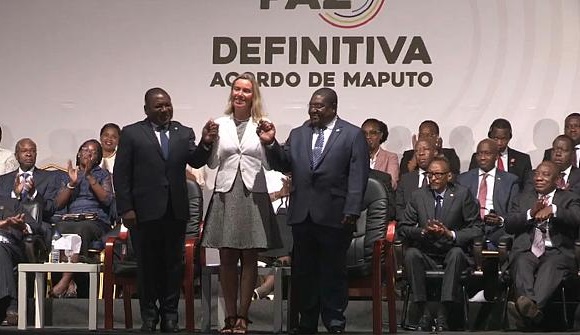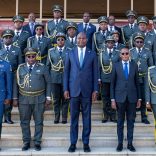Mozambique: President urges SENAMI to use new technologies in combating illegal immigration
Mozambique: Thomashausen calls for transparency audit of EU’s €60 million to demobilise Renamo combatants

File photo: Euronews
In an interview with Lusa, South African lawyer Andre Thomashausen called for a transparent financial audit of the €60 million European Union (EU) money allocated to the disarmament, demobilisation and reintegration of Mozambican National Resistance (Renamo) ex-combatants.
“It is becoming urgent that civil society, parliamentary groups in the European parliament, and the parliaments of European Union member states demand a financial audit [to establish] how the €60 million was spent: who benefited, who received how much and for what purpose,” Thomashausen told Lusa on Saturday.
The analyst questioned whether it is “benefiting only foreign non-governmental organizations (NGOs) linked to the EU, or also Mozambicans”, and whether “there are also NGOs linked to the opposition party, Renamo, which may be well positioned to assist in the demobilisation of their men”.
Then-EU High Representative Frederica Mogherini announced the allocation of the €60 million (up until 2022) in August 2019 during the signing of the Peace and National Reconciliation Agreement by President Filipe Jacinto Nyusi and Renamo leader Ossufo Momade.
Read more: EU allocates € 60 million to implement Mozambique peace agreement – Mogherini
The new peace agreement provided for the disarmament, demobilisation and reintegration of the main opposition party’ armed wing, it was announced at the time.
“But, a few months later, in December, the EU ambassador to Mozambique [António Sanchez-Benedito] Gaspar explained that €10 million of this money had already been allocated in support of communities that suffered the consequences of the war, and that an additional €25 million would be allocated at the beginning of 2020 as subsidies to certain organisations to facilitate the reintegration of demobilised persons, with the remaining €25 million allocated by the end of 2022, again in support of NGOs and groups facilitating the process,” Thomashausen observed.
“All this is very strange,” Thomashausen told Lusa, because, in the last 15 months, only 1,000 people have been demobilised “and, as far as is known, and it is well documented, the total amount spent for each one of these people was US$1,000 (€858.30) at most”.
For the lawyer, if Mozambique demobilised 1,000 people per year at an average of €1,000 each, “after five years it would have spent five million Euros – not even 10% of the amount allocated by the European Union”.
The South African analyst stressed that, so far, none of the amount allocated by the European Union to the most recent peace process in Mozambique to guarantee and facilitate the demobilisation and reintegration of more than 5,000 Renamo ex-combatants had so far been spent.
“We don’t even know if the money went into the Common Fund administered by the United Nations, or if it was allocated directly by the European Union, and on what basis, on what criteria, under what conditions, because there is no transparency,” he stressed.
The South African lawyer and retired University of South Africa (UNISA) professor also considered that the insurgency in central Mozambique, with “practically weekly attacks” on vehicles, buses and public facilities, “could have been avoided if money from the EU €60 million had been allocated to subsidies and a small lifetime pension for former Renamo combatants”.
On October 17 this year, Ambassador António Sanchez-Benedito Gaspar explained to Lusa that the European Union had so far made about €62 million available for the DDR process, now in its third phase, with 1,075 former Renamo guerrillas out of a total of 5,000 expected to hand over their weapons already processed.
On March 13 this year, the European Union announced a partnership agreement with the United Nations Office of Services for Projects (UNOPS) to provide, through to 2022, two million Euros in support for the implementation of the peace and reconciliation agreement in Mozambique.
The project will “directly support the disarmament, demobilisation and reintegration (DDR) process, ensuring that former combatants receive necessary assistance in the transition to their reintegration into the community,” the EU delegation in Maputo announced in a statement.












Leave a Reply
Be the First to Comment!
You must be logged in to post a comment.
You must be logged in to post a comment.